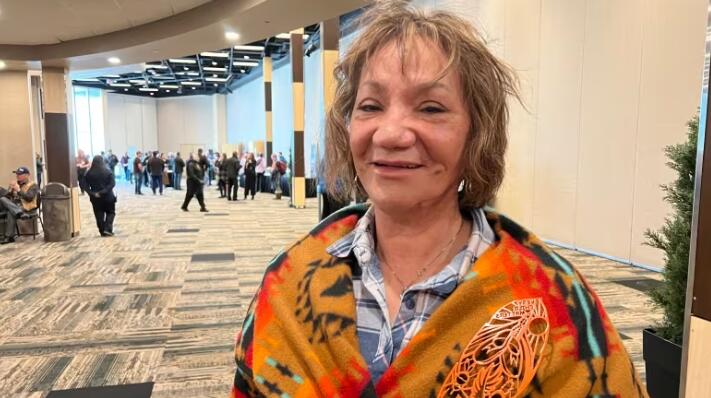Île-à-la-Crosse school survivors meet in Saskatoon, want recognition for abuse they endured

Île-à-la-Crosse school operated for more than 100 years, survivors not included in previous settlements
Hundreds of boarding school survivors are in Saskatoon this weekend. It’s the first time so many people who were forced to go to the Île-à-la-Crosse boarding school in northern Saskatchewan are together.
Organizers of the event, which is running until Sunday at TCU Place, are calling it a “survivors’ gathering.” They say it’s a chance to share stories and push for recognition for physical, sexual and emotional abuse they endured at the school.
Survivors drove from all over North America, including Vancouver, Stanley Mission, the Northwest Territories and even Idaho. They have never received government financial compensation for what they endured in Île-à-la-Crosse.
Michelle LeClair, vice-president of Métis Nation-Saskatchewan (MN-S), said the gathering is a chance for MN-S to hear what the survivors would like to see done in the long-run in terms of compensation and healing.

LeClair said the powers that be cannot simply say sorry and make promises.
“Big organizations like the Catholic Church have to include reconciliation and accommodation. Accommodation means money to restore the community to what it was when they found it. And those were healthy, happy communities,” LeClair said.
“Now we see the destruction. Destruction of many families, communities, and we need to get that back.”
Legal experts are present at the gathering to update attendees on the recent Survivors’ Committee class-action lawsuit.
The boarding school in Île-à-la-Crosse had about 1,500 children from northern Saskatchewan, most of them Métis, forced to attend from the 1860s to the 1970s.
Of the children who attended, between 600 and 700 are still alive, according to MN-S.

While many of these survivors say they suffered abuse and discrimination at the school, advocates say historic, inconsistent government policies have held them back from receiving compensation.
LeClair said Île-à-la-Crosse survivors have received a lot of misinformation in the past from law firms that were supposed to be working on their compensation case. She said it’s time for them to get transparency.
“This whole [class] action is run by many, not a few, because they had not felt included and now they are. So this is a fantastic room and I’m just happy that we’re here together,” LeClair said of the Saskatoon gathering.
- Île-à-la-Crosse, Sask. boarding school survivors push for recognition in their lifetimes
Why Île-à-la-Crosse school survivors aren’t compensated
The Truth and Reconciliation Commission of Canada described the schooling in Île-à-la-Crosse as “long and complex.”
The Catholic church ran a day school there in 1847. It became a boarding school by the 1860s. That pre-dates the federal residential school system — which was running by the 1880s — which is why the school isn’t technically considered a residential school.
Children there, however, were also discriminated against, neglected and forced to stop speaking their languages such as Cree and Michif.

The MN-S has previously told CBC that both provincial and federal governments funded the school at different points.
Vacillation between Canada and the provinces about who was responsible for the Métis led to several inconsistent policies, including complicated funding for Île-à-la-Crosse, according to the Métis National Council (MNC).
MNC president Cassidy Caron has told CBC that this erratic history is a big reason Île-à-la-Crosse survivors have been left out of past mediation such as the 2006 Indian Residential School Settlement Agreement (IRSSA), which funded commemoration and healing efforts, along with individual compensation for survivors.
- Sask. boarding school survivors launch proposed class-action lawsuit against federal, provincial governments
The survivors
Abbie Maurice-Crook, 72, is an Île-à-la-Crosse boarding school survivor who drove to Saskatoon for the gathering all the way from Hay River, N.W.T. She said it was important for her to be there, because she has experienced much trauma in her life.
“It’s important because this actually did happen. It’s people’s lives, and a lot of people were so traumatized that they didn’t have a hope,” Maurice-Crook said.
She said she knows that some other survivors died of overdoses and suicide, and has seen the trauma caused by the Île-à-la-Crosse school impact generations that followed hers.

The proud grandmother said she sometimes struggles with her identity and her memories.
“There’s periods in my life I don’t remember. There’s gaps, is what I’m saying. It’s gonna take awhile for that stuff. There [are things] I do remember, or it has taken awhile because I’ve come a long ways in terms of being who I am today,” Maurice-Crook said.
She said being at the gathering is a good step for her.
“Just to be acknowledged that I did experience trauma and sexual abuse. Being denied my family, being denied even trying to speak my language.”
LeClair said the survivors’ gathering in Saskatoon means a lot to the people there and their futures.
“Just to have their voice heard around what trauma is, what it looks like, how you feel it, trauma healing, how are we going to heal. And we’re really hoping it’s going to be solution-based,” LeClair said.
Related News
Trade war, slumping border traffic: What does that mean for the Gordie Howe bridge?
Amid U.S. President Donald Trump’s tariffs which have triggered a trade war with Canada, cross-border trips haveRead more
Trump administration threatens Harvard’s foreign enrolment, tax-exempt status
U.S. Homeland Security Secretary Kristi Noem speaks during an event on April 9, in Washington,Read more
